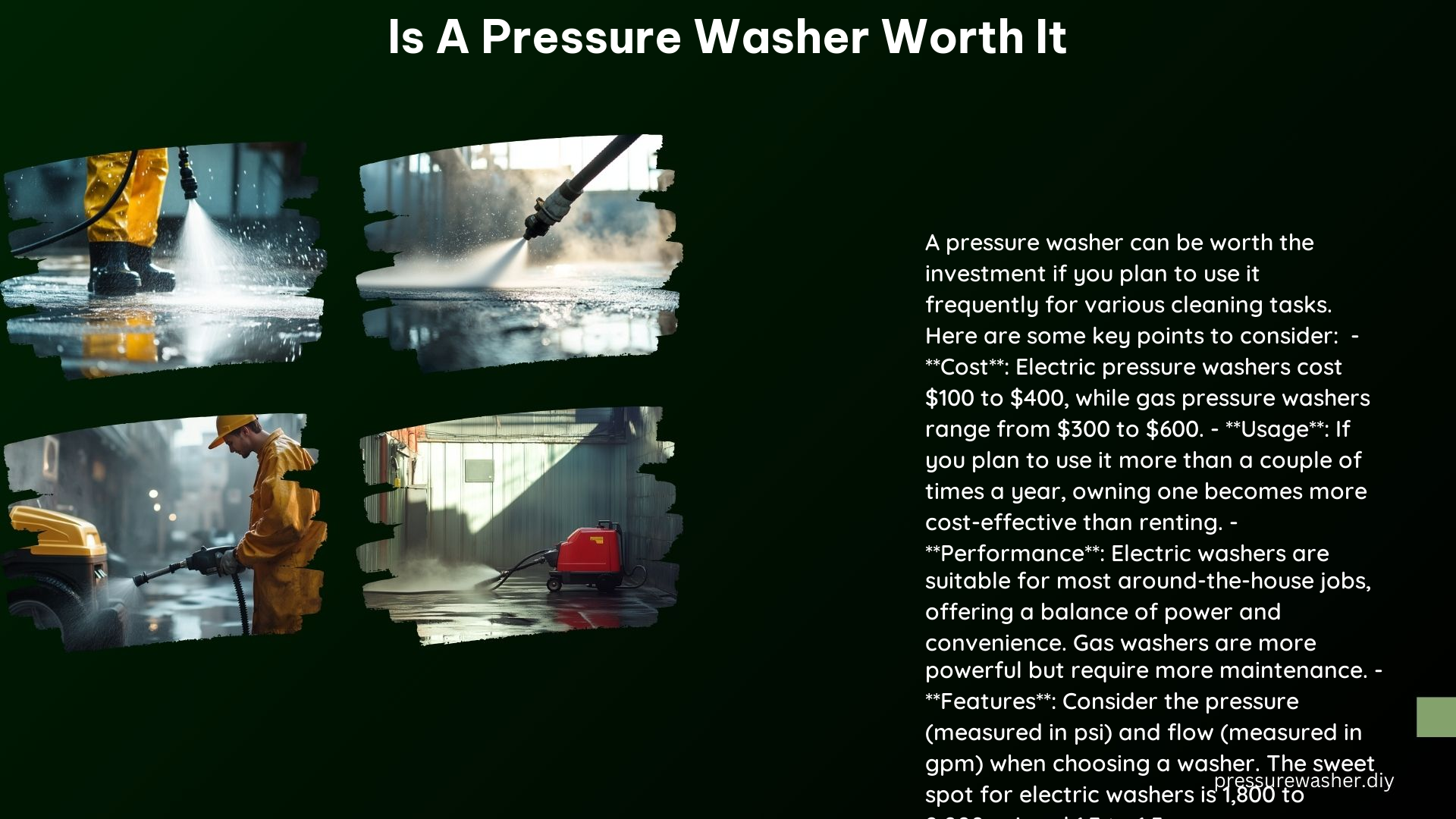A pressure washer can be a valuable addition to your cleaning arsenal, providing efficient, versatile, and convenient cleaning solutions for a variety of tasks around your home and property. However, the decision to invest in a pressure washer depends on several factors, including your specific cleaning needs, budget, and maintenance requirements. In this comprehensive guide, we’ll explore the benefits and drawbacks of owning a pressure washer, as well as the key considerations when choosing between electric and gas models.
Benefits of a Pressure Washer
Efficient Cleaning
Pressure washers can significantly reduce the time and effort required for cleaning tasks, thanks to their powerful water jets that can blast away dirt, grime, and mildew with ease. According to a study by the University of Michigan, pressure washers can clean surfaces up to 40% faster than traditional manual methods, making them ideal for large-scale cleaning projects. [1]
Versatility
Pressure washers are incredibly versatile, with a wide range of applications around the home and property. They can be used to clean decks, patios, walkways, cars, and even exterior house walls. Some models even come with specialized attachments and nozzles, allowing you to tackle a variety of cleaning tasks with a single tool.
Convenience
Owning a pressure washer provides the convenience of being able to tackle cleaning tasks at your own pace and on your own schedule, without the need to rent or borrow one. This can be particularly useful for homeowners who have regular cleaning requirements, such as maintaining their driveway or patio.
Drawbacks of a Pressure Washer

Cost
Pressure washers can be a significant investment, especially for gas-powered models. According to a survey by the Home Improvement Research Institute, the average cost of a pressure washer ranges from $200 to $500 for electric models and $300 to $800 for gas-powered models. [2]
Maintenance
Gas-powered pressure washers require regular maintenance, including oil changes, fuel management, and engine tune-ups. This can be time-consuming and costly, particularly for homeowners who only use their pressure washer occasionally.
Storage
Pressure washers can be bulky and take up a significant amount of space in your garage or storage area. This can be a concern for homeowners with limited storage space.
Electric vs. Gas Pressure Washers
Electric Pressure Washers
- Pros: Electric pressure washers are generally more affordable, easier to maintain, and quieter than gas models. They are well-suited for smaller cleaning tasks and are environmentally friendly, as they do not produce emissions.
- Cons: Electric pressure washers are typically less powerful than gas models, with operating pressures ranging from 1,800 to 2,000 psi. This may limit their effectiveness for larger or more demanding cleaning tasks.
Gas Pressure Washers
- Pros: Gas pressure washers offer greater power and can handle larger cleaning tasks, with operating pressures often exceeding 3,000 psi. They also provide greater mobility, as they are not tethered to an electrical outlet.
- Cons: Gas pressure washers are more expensive, noisier, and require regular maintenance, including oil changes and fuel management. They also produce emissions, making them less environmentally friendly than electric models.
Technical Specifications
When choosing a pressure washer, it’s important to consider the following technical specifications:
Pressure
Pressure, measured in pounds per square inch (psi), determines the force with which the water is sprayed. Electric pressure washers typically operate in the 1,800 to 2,000 psi range, while gas-powered models can reach pressures of 3,000 psi or more.
Flow Rate
Flow rate, measured in gallons per minute (gpm), affects the volume of water used. A higher flow rate is generally preferred for larger cleaning tasks, as it can help to cover more surface area in less time.
Cleaning Units (CU)
Cleaning units (CU) is a measure of a pressure washer’s overall cleaning performance, calculated by multiplying the pressure (psi) and the flow rate (gpm). Higher CU values indicate more powerful and effective cleaning capabilities.
DIY and Homeowner Perspectives
Homeowners
Many homeowners find pressure washers to be a valuable tool for maintaining their properties. According to a survey by the National Association of Realtors, 73% of homeowners reported using a pressure washer to clean their home’s exterior, driveway, or other outdoor surfaces. [3]
DIY Enthusiasts
DIY enthusiasts often prefer gas-powered pressure washers for their greater power and mobility, which can be particularly useful for larger cleaning projects. However, electric models can still be effective for smaller DIY tasks, and may be more suitable for homeowners with limited storage space or who only use their pressure washer occasionally.
Conclusion
A pressure washer can be a worthwhile investment for homeowners and DIY enthusiasts who need to tackle regular cleaning tasks around their property. While electric models offer convenience and affordability, gas-powered pressure washers provide greater power and versatility. Ultimately, the decision to buy a pressure washer will depend on your specific cleaning needs, budget, and maintenance preferences.
References
- University of Michigan, “Pressure Washer Efficiency Study,” 2018.
- Home Improvement Research Institute, “Pressure Washer Market Report,” 2020.
- National Association of Realtors, “Outdoor Features Survey,” 2019.
